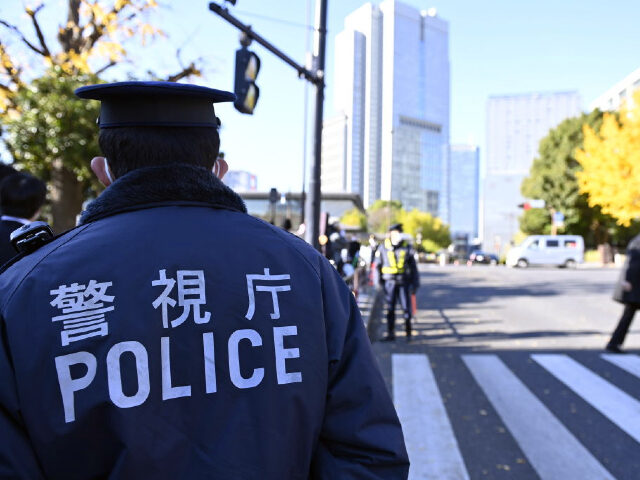The National Police Agency (NPA) of Japan published statistics on Thursday showing that the country experienced an increase in criminal activity in 2022 for the first time in 20 years.
The report tracked the number of police reports on documented crimes in addition to arrests. Among the crimes identified as seeing a significant rise in frequency were rape, child abuse, and street crimes, such as muggings and bicycle thefts. The rates of domestic violence and child abuse hit “all-time highs,” according to a report by the Indian news site First Post. Police also referred a record number of children to consultation centers after finding evidence of abuse.
The increase follows a dramatic drop in crime following the eruption of the coronavirus pandemic originating in Wuhan, China, in late 2019. Japan shut its schools in February 2020 and sternly encouraged mask usage and “social distancing.” Relatively lax, compared to other parts of the world, government coronavirus restrictions caused more severe disruption as “virus vigilantes” threatened violence against businesses seeking to operate or simply people suspected of planning to participate in gatherings, such as people carrying guitars on the street.
Crime joins growing concerns surrounding schoolchildren suicides and a catastrophic fertility rate in problems previously facing Japan that have been significantly exacerbated in the wake of the pandemic.
“Japan is facing a bleak situation in regard to crime,” Japanese newspaper Asahi Shimbun quoted police as saying in a statement following the release of 2022 crime statistics on Thursday. According to the newspaper, police expressed particular concern about what it called street crimes, documenting a 20.9-percent increase in bicycle theft and an over 30-percent increase in thieves robbing pedestrians on the street. Documented cases of rape reportedly increased by nearly 20 percent. Asahi noted “record high” numbers of children referred to social services in response to abuse concerns and cases of domestic violence – crimes that both became of increasing concern during pandemic lockdowns and other civil rights restrictions.
“[T]he numbers of murders and robberies were almost the same as the previous year,” Asahi observed. “By contrast, rape and indecent assault cases rose by 19.3 percent and 9.9 percent, respectively, from the previous year, surpassing the figures from the year before for the second consecutive year.”
Outside of violent crime, Japan is also experiencing skyrocketing rates of telephone scams, often targeted at the elderly. Japan has one of the world’s oldest populations and has a life expectancy of 85 years. Scammers managed to steal about $281 million from victims throughout 2022, the first time that number increased since 2014. Police documented an over 20-percent increase in the number of such crimes documented from the past year.
Police documented a 5.9-percent increase in incidents of crime in general from 2021.
Crime peaked in Japan in 2002, First Post noted, and had been steadily declining for two decades. The country maintains, despite the recent increases in the crime rate, a position as one of the world’s safest countries. Among the recent controversies to achieve nationwide news status is a report from Kobe that a police sergeant had received a warning from superiors after falling asleep and playing video games on the job because he was “bored.”
Police claimed that the pandemic played some role in the increase in crime. According to Asahi, authorities stated that 2022 saw a dramatic increase in foot traffic in cities, as many returned from the rural areas to which they retreated at the height of the pandemic and made the cities more crowded. Asahi did not mention if police identified isolation recommendations or school closers as potential triggers.
Then-Japanese Prime Minister Abe Shinzo – himself the victim of a very public assassination in 2022 – shut down all schools through high school in February 2020. While the government did not force extreme business shutdowns as occurred in neighboring China, many major corporations ordered employees to work from home and smaller businesses shut down voluntary, or lost customers afraid to enter public spaces.
Later that year, in November, Nikkei Asian Review documented the emergence of vigilantes threatening businesses that considered reopening, independent of any government efforts to close them, part of a tradition known as jishuku keisatsu, or “self-restraint police.” Owners of businesses where the public gathers, such as bars and restaurants, were prime targets for the phenomenon.
More recently, the Japanese government began considering ways to transition society back to a sense of pre-pandemic normal. While forcefully recommending the use of sanitary masks on children a year ago, Japan’s Mainichi Shimbun reported on Friday that Tokyo is mulling a change in classification for the coronavirus originating in Wuhan, moving it into “the same medical category as common infectious diseases such as seasonal influenza from May 8, paving the way for further relaxing preventative measures.” A potential move to remote recommendations for mask-wearing at children’s graduations may be among the first advisories removed.
Friday also marked the first Setsubun festival since the pandemic to feature crowds gathering for traditional ceremonies in much of the country. Setsubun marks the end of winter on the lunar calendar and is typically celebrated with events in which crowds throw beans at masked devils as a way to exorcise evil and welcome good fortune with the spring.

COMMENTS
Please let us know if you're having issues with commenting.